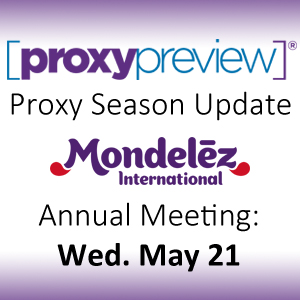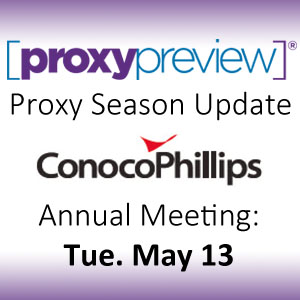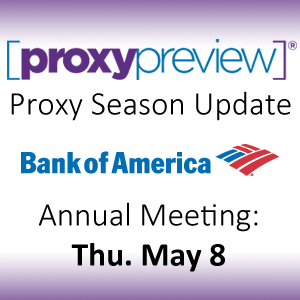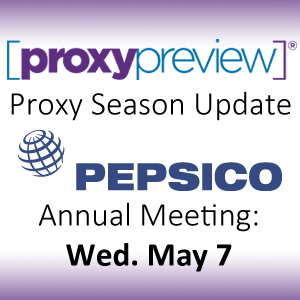
Thank You For Following Proxy Season Updates
As the 2014 proxy season winds down, Proxy Season Updates are wrapping up. We hope our updates on some of the biggest companies that received social or environmental shareholder proposals in 2014 helped you leverage the power of stock ownership to promote social change.
You can still download Proxy Preview 2014 to learn more about environmental, social, and governance (ESG) issues. And #ProxyPreview will return to Twitter next year to help you stay updated on info about Proxy Preview or the proxy season.
While most of the companies we’ve highlighted have had their annual meetings and counted this year’s ballots, the issues shareholders voted on remain relevant, and many are likely to come up again next year. Take a look back through the advocacy positions and expert insights to become an ESG expert.
Until next year, in health,
The Proxy Preview team
Yahoo!

2014 Annual Meeting: 11:00 AM EDT, Wednesday, June 25, 2014
Santa Clara Marriott, 2700 Mission College Boulevard, Santa Clara, California 95054
Yahoo! has three pending ESG shareholder proposals in 2014.
- POLITICAL ACTIVITY: Lobbying
-
This resolution from the New York State Common Retirement Fund asks for annual reports on policy, payments, memberships in groups that write model legislation, information on how these payments occur, and how management and the board of directors monitor them. The proposal says the reports should include:
1. Company policy and procedures governing lobbying, both direct and indirect, and grassroots lobbying communications.
2. Payments by Yahoo! used for (a) direct or indirect lobbying or (b) grassroots lobbying communications, in each case including the amount of the payment and the recipient.
3. Yahoo!’s membership in and payments to any tax-exempt organization that writes and endorses model legislation.
4. Description of management’s decision making process and the Board’s oversight for making payments described in sections 2 and 3 above.
For purposes of this proposal, a “grassroots lobbying communication” is a communication directed to the general public that (a) refers to specific legislation or regulation, (b) reflects a view on the legislation or regulation and (c) encourages the recipient of the communication to take action with respect to the legislation or regulation. “Indirect lobbying” is lobbying engaged in by a trade association or other organization of which Yahoo! is a member.
Both “direct and indirect lobbying” and “grassroots lobbying communications” include efforts at the local, state and federal levels. Neither “lobbying” nor “grassroots lobbying communications” include efforts to participate or intervene in any political campaign or to influence the general public or any segment thereof with respect to an election or referendum.
The report shall be presented to the Audit Committee or other relevant oversight committees and posted on Yahoo!’s website.
- POLITICAL ACTIVITY: Political Spending
-
Trillium Asset Management proposes that Yahoo! provide a semi-annual report disclosing the company’s:
1. Policies and procedures for making, with corporate funds or assets, contributions and expenditures (direct or indirect) to (a) participate or intervene in any political campaign on behalf of (or in opposition to) any candidate for public office, or (b) influence the general public, or any segment thereof, with respect to an election or referendum.
2. Monetary and non-monetary contributions and expenditures (direct and indirect) used in the manner described in section 1 above, including:
a. The identity of the recipient as well as the amount paid to each; and
b. The title(s) of the person(s) in the Company responsible decision-making.
- HUMAN RIGHTS: Human Rights Board Committee
-
Harrington Investments is requesting a new “standing committee to oversee the Company’s responses to domestic and international developments in human rights that affect our company.” The proposal mentions “unprecedented surveillance frequency, capacity, and government requests for data, as well as increasing compliance costs for numerous and sometimes conflicting US and foreign laws, regulations, and their interpretations,” and says none of the company’s directors currently has responsibility for addressing issue of privacy and freedom of speech, making the proposed committee necessary.
Download Proxy Preview 2014 to find more lobbying, political spending, and human rights resolutions.
Caterpillar

2014 Annual Meeting: 9:00 AM EDT, Wednesday, June 11, 2014
Crossroads Arena, 2800 S. Harper Road, Corinth, MS 38834
Caterpillar has two pending ESG shareholder proposals in 2014.
- HUMAN RIGHTS: Review of Global Corporate Standards
-
This resolution requests the Board of Directors to review and amend, where applicable, Caterpillar’s policies related to human rights that guide international and U.S. operations. The supporting statement notes:
Caterpillar’s current policy, the Worldwide Code of Conduct, contains no references to existing international human rights codes except for a corporate policy of non-discrimination, and aspirational goals to maintain employee health and safety. It does not apply to company dealers whose activities can carry extensive reputational risks for Caterpillar. We believe company policies should reflect more robust, comprehensive understanding of human rights.
- HUMAN RIGHTS: Sales to Sudan
-
This resolution looks to prevent Caterpillar products from being sold to the Government of Sudan or entities controlled by it, noting that sales of Caterpillar products to Sudan companies by Caterpillar subsidiaries totaled $265.5 million in the fiscal years 2008-2010. The resolutions requests a report
disclosing the terms and enforcement mechanisms, including internal controls related to its Enterprise Export Control Compliance Program, including but not limited to:
– Audit verification and tracking of product sales;
– Publish findings, successes, challenges relating to its policies/procedures effectiveness;
– Senior management and board-level oversight.
Download Proxy Preview 2014 to find more human rights resolutions.
Walmart

2014 Annual Meeting: 8:00 AM EDT, Friday, June 6, 2014
Bud Walton Arena, University of Arkansas Campus, Fayetteville, AR 72701
Walmart has one pending ESG shareholder proposal in 2014.
- POLITICAL ACTIVITY: Lobbying
-
This resolution from Zevin Asset Management asks for annual reports on policy, payments, memberships in groups that write model legislation, information on how these payments occur, and how management and the board of directors monitor them. The proposal says the reports should include:
1. Company policy and procedures governing lobbying, both direct and indirect, and grassroots lobbying communications.
2. Payments by Walmart used for (a) direct or indirect lobbying or (b) grassroots lobbying communications, in each case including the amount of the payment and the recipient.
3. Walmart’s membership in and payments to any tax-exempt organization that writes and endorses model legislation.
4. Description of management’s and the Board’s decision making process and oversight for making payments described in section 2 and 3 above.
For purposes of this proposal, a “grassroots lobbying communication” is a communication directed to the general public that (a) refers to specific legislation or regulation, (b) reflects a view on the legislation or regulation and (c) encourages the recipient of the communication to take action with respect to the legislation or regulation. “Indirect lobbying” is lobbying engaged in by a trade association or other organization of which Walmart is a member.
Both “direct and indirect lobbying” and “grassroots lobbying communications” include efforts at the local, state and federal levels.
The report shall be presented to the Audit Committee or other relevant oversight committees and posted on Walmart’s website.
Download Proxy Preview 2014 to find more lobbying resolutions.
ExxonMobil

2014 Annual Meeting: 10:30 AM EDT, Wednesday, May 28, 2014
Morton H. Meyerson Symphony Center, 2301 Flora Street, Dallas, Texas 75201
ExxonMobil has three pending ESG shareholder proposal in 2014.
- ENVIRONMENT: Greenhouse Gas Reduction Targets
-
This proposal, filed by the Sisters of St. Dominic of Caldwell New Jersey, begins by noting that “mounting scientific, social, and financial evidence demonstrates the urgency to establish and meet specific, measurable, and sustainable goals to reduce greenhouse gas (GHG).” The proposal asks that ExxonMobil adopt quantitative goals for reducing the GHGs emitted by both its operations and its products.
- POLITICAL ACTIVITY: Lobbying
-
This resolution from the United Steelworkers asks for annual reports on policy, payments, memberships in groups that write model legislation, information on how these payments occur, and how management and the board of directors monitor them. The proposal says the reports should include:
1. Company policy and procedures governing lobbying, both direct and indirect, and grassroots lobbying communications.
2. Payments by ExxonMobil used for (a) direct or indirect lobbying or (b) grassroots lobbying communications, in each case including the amount of the payment and the recipient.
3. ExxonMobil’s membership in and payments to any tax-exempt organization that writes and endorses model legislation.
4. Description of the decision making process and oversight by management and the Board for making payments described in sections 2 and 3 above.
For purposes of this proposal, a ‘grassroots lobbying communication’ is a communication directed to the general public that (a) refers to specific legislation or regulation, (b) reflects a view on the legislation or regulation and (c) encourages the recipient of the communication to take action with respect to the legislation or regulation. ‘Indirect lobbying’ is lobbying engaged in by a trade association or other organization of which ExxonMobil is a member.
Both ‘direct and indirect lobbying’ and ‘grassroots lobbying communications’ include efforts at the local, state and federal levels.
The report shall be presented to the Audit Committee or other relevant oversight committees of the Board and posted on the company’s website.
- SOCIAL: LGBT Rights
-
This proposal from the New York State Common Retirement fund asks that ExxonMobil “amend its written equal employment opportunity policy to explicitly prohibit discrimination based on sexual orientation and gender identity and to substantially implement the policy.”
Proponents have been extremely successful in persuading large companies that discrimination on the basis of sexual orientation and gender identity cannot be tolerated, although the latter is a second frontier. This issue consistently gets high levels of investor support and prompts lots of withdrawal agreements. As lesbian, gay, bisexual, and transgender (LGBT) rights have become more accepted, the number of shareholder resolutions has dropped.
Download Proxy Preview 2014 to find more climate, lobbying, and LGBT rights resolutions.
Chevron

2014 Annual Meeting: 9:00 AM EDT, Wednesday, May 28, 2014
Permian Basin Petroleum Museum, 1500 Interstate 20 West, Midland, Texas, 79701
Chevron has four pending ESG shareholder proposal in 2014.
- ENVIRONMENT: Hydraulic Fracturing
- POLITICAL ACTIVITY: Lobbying
-
This resolution from the American Federation of State, County and Municipal Employees (AFSCME) asks for annual reports on policy, payments, memberships in groups that write model legislation, information on how these payments occur, and how management and the board of directors monitor them. The proposal says the reports should include:
1. Company policy and procedures governing lobbying, both direct and indirect, and grassroots lobbying communications.
2. Payments by Chevron used for (a) direct or indirect lobbying or (b) grassroots lobbying communications, in each case including the amount of the payment and the recipient.
3. Chevron’s membership in and payments to any tax-exempt organization that writes and endorses model legislation.
4. Description of management’s and the Board’s decision making process and oversight for making payments described in sections 2 and 3 above.
For purposes of this proposal, a “grassroots lobbying communication” is a communication directed to the general public that (a) refers to specific legislation or regulation, (b) reflects a view on the legislation or regulation and (c) encourages the recipient of the communication to take action with respect to the legislation or regulation. “Indirect lobbying” is lobbying engaged in by a trade association or other organization of which Chevron is a member.
Both “direct and indirect lobbying” and “grassroots lobbying communications” include efforts at the local, state and federal levels.
The report shall be presented to the Audit Committee or other relevant oversight committees and posted on Chevron’s website.
- POLITICAL ACTIVITY: Country Selection
-
A perennial proposal form the Teamsters is again on the slate at Chevron. It asks for the company’s “criteria for (i) investment in; (ii) continued operations in; and, (iii) withdrawal from specific high-risk countries.” Until last year the proposal specifically mentioned Burma. The resolution does note that despite democratic reforms in Burma, U.S. Senators have called for a continued ban on doing business with the state-owned oil company, the Myanmar Oil and Gas Enterprise, which National League for Democracy leader Aung San Suu Kyi says “lacks both transparency and accountability at present.” The resolution also notes Chevron’s involvement in other countries “with controversial human rights records: Angola, Kazakhstan, and Nigeria.” The proposal consistently earns about 22 percent, as it did last year.
- SUSTAINABLE GOVERNANCE: Environmental Expert on the Board
Download Proxy Preview 2014 to find more hydraulic fracturing, lobbying, political activity, and sustainable governance resolutions.
Home Depot

2014 Annual Meeting: 9:00 AM EDT, Thursday, May 22, 2014
Cobb Galeria Center, 2 Galleria Parkway SE, Atlanta, Georgia, 30339
Home Depot has one pending ESG shareholder proposal in 2014.
- SOCIAL: Diversity in the Workplace
Download Proxy Preview 2014 to find more social resolutions.
Facebook

2014 Annual Meeting: 2:00 PM EDT, Thursday, May 22, 2014
Sofitel San Francisco Bay, 223 Twin Dolphin Drive, Redwood City, CA 94065
Facebook has three pending ESG shareholder proposals in 2014.
- POLITICAL ACTIVITY: Political Spending
- NorthStar Asset Management is continuing a push it started last year for companies to more explicitly align stated company values with political spending decision-making. It asks Facebook to
create and implement a policy with consistent incorporation of corporate values as defined by Facebook’s policies and public affirmations into Company and FB PAC political and electioneering contribution decisions, and requiring reporting to shareholders at reasonable expense and excluding confidential information on a quarterly basis listing any electioneering or political contribution expenditures occurring during the prior quarter, identifying any contributions that raised an issue of congruency with corporate values, and stating the justification for any such exceptions.
- POLITICAL ACTIVITY: Lobbying
- This resolution from the Benedictine Sisters of Mount Saint Scholastica asks for annual reports on policy, payments, memberships in groups that write model legislation, information on how these payments occur, and how management and the board of directors monitor them. The proposal says the reports should include:
1 . Company policy and procedures governing lobbying, both direct and indirect, and grassroots lobbying communications.
2. Payments by Facebook used for (a) direct or indirect lobbying or (b) grassroots lobbying communications, in each case including the amount of the payment and the recipient.
3. Facebook’s membership in and payments to any tax-exempt organization that writes and endorses model legislation.
4. Description of management’s decision making process and the Board’s oversight for making payments described in sections 2 and 3 above.
For purposes of this proposal, a “grassroots lobbying communication” is a communication directed to the general public that (a) refers to specific legislation or regulation, (b) reflects a view on the legislation or regulation and (c) encourages the recipient of the communication to take action with respect to the legislation or regulation. “Indirect lobbying” is lobbying engaged in by a trade association or other organization of which Facebook is a member.
Both “direct and indirect lobbying” and “grassroots lobbying communications” include efforts at the local, state and federal levels.
The report shall be presented to the Audit Committee or other relevant oversight committees of the Board and posted on the company’s website.
- SOCIAL: Advertising and Childhood Obesity
- The Sisters of the Holy Name have requested a report from Facebook focusing on concerns about food advertising to children. The proposed report would examine “whether the scope, scale and pace of implementation of the company’s advertising and privacy policies are sufficient to prevent material impacts on the company’s finances and operations due to public concerns about childhood obesity and public and private initiatives to eliminate or restrict food marketing to youth.”
Download Proxy Preview 2014 to find more political spending, lobbying, and social resolutions.
Mondelez International

2014 Annual Meeting: 10:00 AM EDT, Wednesday, May 21, 2014
North Shore Center for the Performing Arts, 9501 Skokie Blvd., Skokie, IL 60077
Mondelez has one pending ESG shareholder proposals in 2014.
- ENVIRONMENT: Recyclable Packaging
- This proposal from As You Sow focuses on phasing out non-recyclable packaging, asking for a report “assessing the environmental impacts of continuing to use” non-recyclable packaging, noting new reports that link degraded plastic packaging to toxicity in ocean gyres, which broadens the focus area to threats to marine animals and human environmental health. An EPR proposal last year at Mondelez garnered 9.5 percent.
BE IT RESOLVED THAT: Shareholders of Mondelēz International request the Board to issue a report at reasonable cost, omitting confidential information, by October 1, 2014 assessing the environmental impacts of continuing to use non-recyclable brand packaging.
SUPPORTING STATEMENT: Proponents believe the report should include an assessment of the reputational, financial, and operational risks associated with continuing to use non-recyclable brand packaging and, to the extent possible, goals and a timeline to phase out non-recyclable packaging.
Download Proxy Preview 2014 to find more recyclable packaging shareholder resolutions.
Google

2014 Annual Meeting: 5:00 PM EDT, Wednesday, May 14, 2014
1600 Amphitheatre Parkway, Mountain View, California 94043
Google has two pending ESG shareholder proposals in 2014.
- POLITICAL ACTIVITY: Lobbying
- OTHER: Tax Fairness
- Domini Social Investments is promoting a set of principles about taxes, contending in its proposal to Google that the company’s aggressive strategies undermine company chairman Eric Schmidt’s commitment to always “do the right thing.” Domini says publicity about the company’s tax practices in the United Kingdom and France have harmed its reputation, since business is funneled through the tax haven of Bermuda, and contends that such strategies “undermine democracy and rule of law,” taking money away from needed government services such as “law enforcement, market regulation, judicial systems, infrastructure maintenance, public education, poverty alleviation, environmental protection, national defense and scientific research.” In Domini’s view, the company’s “complex tax arrangements may result in misallocations of capital and mask the true sources of long-term value” for investors. To “address the tax challenges of the digital economy,” the proposal therefore is promoting the following principles:
A commitment to pay Google’s fair share of taxes (Johnson & Johnson Credo).
Avoidance of transactions that would not be fully justifiable should they become public (Vodafone Tax Code of Conduct)
Consideration of any misalignment between tax strategies and Google’s stated objectives and policies regarding social and environmental sustainability
Consideration of impact of tax strategies on reputation and brand value (Vodafone Code)
Though it does not face a shareholder resolution on the subject, Google has been at the forefront of the shareholder debate over data privacy. Read the advocacy position below from Patrick Doherty of the New York State Comptroller’s office to learn more.
Download Proxy Preview 2014 to find more lobbying, tax fairness, and data privacy shareholder resolutions.
ADVOCACY POSITION: Data Privacy
High Stakes Over Data Privacy

Patrick Doherty
Director, Corporate Governance Office of the New York State Comptroller
Disclosures of data monitoring programs run by the National Security Agency highlight the increasingly complex relationship between legitimate law enforcement and national security concerns and the need to protect individual privacy in the digital age. As global communications platforms become increasing ubiquitous, government agencies at all levels, are increasingly seeking confidential customer data.
Customer trust is critical for any business, but especially for internet and telecommunications companies that routinely gather massive amounts of personal data concerning and affecting the lives of hundreds of millions of people in the U.S. and around the world.
The Congressional newspaper The Hill commented: “The stakes are high for companies like Google and Microsoft that depend on users trusting them with their most sensitive personal information. If users worry that the information they share isn’t safe from snooping government agents, they are less likely to use the online services, meaning less revenue for the companies”. This is also true for telecommunications companies like AT&T and Verizon, who can lose domestic customers, as well as access to foreign markets.
Responding to these concerns, major U.S. internet companies like Google, Microsoft, Yahoo!, Twitter, Facebook, and LinkedIn have begun to issue periodic “transparency reports” that disclose, in broad terms, what law enforcement has requested of them. While there are statutory limits on the amount of detail the companies can reveal concerning those requests, the companies have been actively pressing the federal government for permission to disclose more. Major telephone companies, however, refused to disclose any information, even when there were no legal or regulatory impediments to their doing so.
The New York State Common Retirement Fund, concerned that a failure to persuade customers of a genuine and longterm commitment to privacy rights could present companies with serious financial, legal, and reputational risks, filed a resolution at AT&T (along with other investors) asking AT&T to follow the lead of the internet companies by publishing semi-annual reports, providing statistics and analysis regarding requests for customer data by U.S. and global law enforcement agencies. Trillium Asset Management filed a companion resolution at Verizon.
Both AT&T and Verizon acceded to our requests and published reports on government requests, including National Security Letters, to the extent that they could legally do so. The companies also pledged to expand on that release as changing government policy permits. New York State Comptroller Tom DiNapoli commented that “it is reassuring that AT&T has responded to shareholders’ justifiable concerns over the security of customer information… The privacy debate is ongoing (and) AT&T should show leadership on these issues by fully engaging in that debate.”
Download Proxy Preview 2014 to find more data privacy shareholder resolutions.
ConocoPhillips

2014 Annual Meeting: 10:00 AM EDT, Tuesday, May 13, 2014
Omni Houston Hotel at Westside, 13210 Katy Freeway, Houston, Texas 77079
ConocoPhillips has two pending ESG shareholder proposals in 2014.
- ENVIRONMENT: GHG Reduction Targets
- POLITICAL ACTIVITY: Lobbying
Download Proxy Preview 2014 to find more greenhouse gas emissions and lobbying shareholder resolutions.
Anadarko Petroleum

2014 Annual Meeting: 9:00 AM EDT, Tuesday, May 13, 2014
The Hyatt Market Street Hotel, 9595 Six Pines Drive, Suite 1100, The Woodlands, Texas, 77380
Anadarko has two pending ESG shareholder proposals in 2014.
- ENVIRONMENT: Carbon Bubble
- POLITICAL ACTIVITY: Political Spending
- The New York State Common Retirement Fund proposes that Anadarko Petroleum provide a semi-annual report disclosing the company’s:
1. Policies and procedures for making, with corporate funds or assets, contributions and expenditures (direct or indirect) to (a) participate or intervene in any political campaign on behalf of (or in opposition to) any candidate for public office, or (b) influence the general public, or any segment thereof, with respect to an election or referendum.
2. Monetary and non-monetary contributions and expenditures (direct and indirect) used in the manner described in section 1 above, including:
a. The identity of the recipient as well as the amount paid to each; and
b. The title(s) of the person(s) in the Company responsible for decision-making.
The report shall be presented to the board of directors or relevant board committee and posted on the Company’s website.
Download Proxy Preview 2014 to find more carbon bubble and political spending resolutions.
ADVOCACY POSITION: Carbon Bubble
Preparing for a Low Carbon Economy

Danielle Fugere
President & Chief Counsel, As You Sow
Shareholders have filed carbon asset risk resolutions with 10 oil, gas, coal, and utility companies this year seeking information on whether these companies are prepared to financially succeed in an increasingly carbon constrained world.
In the 2012 World Energy Outlook, the International Energy Agency and Carbon Tracker noted that no more than one-third of proven fossil fuel reserves can be burned prior to 2050 if the world is to achieve the 2 degree Celsius goal beyond which global warming will have dire ramifications. If laws are adjusted to recognize this limitation, the vast majority of fossil fuel companies will be left with “stranded assets” in the form of unburnable reserves and underused infrastructure. The majority of such companies will then be overvalued, presenting the risk of a worldwide “carbon bubble.”
In addition to this risk, recent reports, including a March 2013 report by Citigroup, predict that demand for fossil fuels may plateau within the decade due to factors such as increasing worldwide fuel efficiency, fuel switching, increasing competition from renewables, and environmental regulations.
Against this backdrop of lower demand and, thus, reduced prices, Goldman Sachs and other analysts have raised concerns about the rising costs and declining return on equity among major oil producers, particularly for projects that have long payback horizons or high costs, such as certain non-conventional fuels.
These concerns have been noted by investors. In September of 2013, in an effort coordinated by CERES, shareholders with nearly $3 trillion in assets wrote to 45 of the world’s largest oil and gas, coal, and electric utility companies asking the companies whether and how they were planning for the risks associated with a low carbon future and how these scenarios will impact capital expenditures and current assets.
Last year, As You Sow’s resolution at CONSOL Energy focused on the potential for an economy-wide carbon bubble if global governments were to act to limit global warming to 2 degrees Celsius. This year, we are asking companies not only how they would be equipped to deal with such a scenario, but also how decreased demand for fossil fuels would affect the companies and their investment decisions. This is a moment in time when leading fossil fuel companies can make a decision to end or reduce exploration and development of high cost, high risk reserves and begin a shift to participate in and profit from a clean energy future.
Download Proxy Preview 2014 to find more carbon bubble shareholder resolutions.
ADVOCACY POSITION: Proxy Voting
Proxy Voting is Easier Than You Think

Jonathan Scott
President and Director, Singing Field Foundation
In 2013 I was at a gathering of foundations and individuals involved in environmental and social change philanthropy. Not surprisingly, the subjects of shareowner engagement and proxy voting came up, repeatedly. Yet I was quite surprised to learn that many folks at this meeting were not yet voting their own proxies.
Some simply did not have that option. They were invested in mutual funds, funds of funds or other pooled investments or comingled funds. This made proxy voting difficult if not impossible. Yet many others were theoretically able to engage with the companies they own, but for one reason or another were not doing so – yet.
At that meeting, I resolved to organize a demonstration – a howto illustration of what’s involved in voting your proxies. As a modern American, I decided to do it online and in public. I enlisted help from colleagues at As You Sow, Proxy Impact, and Clean Yield Asset Management, the firm responsible for our foundation’s investments. Our hour-long webinar discussion reviewed the Who, What, Why and How of proxy voting. I then voted proxies in one company, ExxonMobil, live with everybody watching.
Here’s some of what I learned:
Proxy Voting really does matter. More often than not, if you’re not voting your proxies, company management is allowed to vote on your behalf, and invariably votes in favor of management’s position.
You don’t have to be an expert. This is not rocket science. There’s no penalty for abstaining on a question or two. You can focus on those questions you feel most strongly about. And there’s lots of help available out there, from online resources to affordable proxy voting services that will do the work for you. You don’t have to do this on your own.
Shareholder resolutions are not about winning or losing. Each year, resolutions on social and environmental matters, introduced by corporate shareholders, are having a huge impact. That’s because they are about engaging corporate managers in critical issues. Even modest votes deliver powerful messages these companies can’t ignore. Think about it. A vote of only 10 percent on hydraulic fracturing, political spending or climate change could represent millions or even billions in shareholder value. Smart companies pay attention.
You can do this. You own shares in a company. Therefore, you can vote your proxies. And you should.
The video “How to Vote Your Proxies” helps demystify this process for the average shareholder. It uses the 2013 ExxonMobil proxy as an example, but the content is relevant for 2014 and many other companies.
Watch it. Read this issue of Proxy Preview. Get started. You can do this.
Download Proxy Preview 2014 to learn more about how to vote on shareholder resolutions.
United Parcel Service

2014 Annual Meeting: 8:00 AM EDT, Thursday, May 8, 2014
Hotel du Pont, 11th and Market Streets, Wilmington, Delaware 19801
UPS has one pending ESG shareholder proposal in 2014.
- POLITICAL ACTIVITY: Lobbying
- This resolution from Walden Asset Management asks for annual reports on policy, payments, memberships in groups that write model legislation, information on how these payments occur, and how management and the board of directors monitor them. The proposal says the reports should include:
1. Company policy and procedures governing lobbying, both direct and indirect, and grassroots lobbying communications.
2. Payments by UPS used for (a) direct or indirect lobbying or (b) grassroots lobbying communications, in each case including the amount of the payment and the recipient.
3. UPS’s membership in and payments to any tax-exempt organization that writes and endorses model legislation.
4. Description of the decision making process and oversight by management and the Board for making payments described in section 2 above.
For purposes of this proposal, a “grassroots lobbying communication” is a communication directed to the general public that (a) refers to specific legislation or regulation, (b) reflects a view on the legislation or regulation and (c) encourages the recipient of the communication to take action with respect to the legislation or regulation. “Indirect lobbying” is lobbying engage in by a trade association or other organization of which UPS is a member.
Both “direct and indirect lobbying” and “grassroots lobbying communications” include efforts at the local, state and federal levels.
The report shall be presented to the Audit Committee or other relevant oversight committees of the Board and posted on the company’s website.
Download Proxy Preview 2014 to find more lobbying resolutions.
Bank of America

2014 Annual Meeting: 10:00 AM EDT, Thursday, May 8, 2014
Charlotte Marriott City Center, 100 West Trade Street, Charlotte, North Carolina 28202
Bank of America has two pending ESG shareholder proposals in 2014.
- ENVIRONMENT: Financing Greenhouse Gas Emissions
- Sisters of the Holy Names have filed this proposal at Bank of America, asking them to report on how they consider GHG emissions in financing activities.
WHEREAS: Banks contribute to climate change through their financed emissions, which are the emissions induced by a bank’s loans to and investments in companies that emit greenhouse gases. A bank’s financed emissions typically dwarf its other climate impacts and expose it to reputational and financial risks. To measure their financed emissions, banks have access to accounting tools developed by the Greenhouse Gas Protocol, a partnership between the World Resources Institute and the World Business Council for Sustainable Development (http://bit.ly/UxdrSh).
The Carbon Tracker Initiative has found that the mispricing of climate risk from the fossil fuel reserves of oil, gas, and coal producers exposes financial institutions that invest in and lend to these companies to significant financial risks (http://bit.ly/1dQiUQR). Banks that finance carbon-intensive electric utilities also face risks from future regulation of greenhouse gas emissions and the declining costs of renewable power relative to coal.
Bank of America has emphasized the reputational risks it faces from the climate impacts of its financing activities. In its 2012 response to the Carbon Disclosure Project, the bank states: “As societal concern about climate change has grown, there has become an increasing awareness among a range of stakeholders of the role the financial services sector can and should have in promoting climate change mitigation through its financing activities… Some of our clients will necessarily be in carbon intensive industries, and reputational risk could arise if we are not developing the appropriate balance of carbon and low-carbon reliant customers or sources of energy in our business mix.”
Bank of America currently reports an estimate of its overall exposure to carbon emissions from its financing relationships with electric utilities. This reporting, though welcome, does not address emissions from the bank’s clients in other industries. These existing disclosures also do not provide shareholders with a detailed and comprehensive assessment of the bank’s exposure to financial and reputational risks from relationships with clients in carbon-intensive industries.
RESOLVED: Given the broader societal implications of climate change, shareowners request that the Board of Directors report to shareholders by September 2014, at reasonable cost and omitting proprietary information, Bank of America’s assessment of the greenhouse gas emissions resulting from its financing portfolio and its exposure to climate change risk in its lending, investing, and financing activities.
- POLITICAL ACTIVITY: Lobbying
- This resolution from the American Federation of State, County and Municipal Employees (AFSCME) asks for annual reports on policy, payments, memberships in groups that write model legislation, information on how these payments occur, and how management and the board of directors monitor them. The proposal says the reports should include
1. Company policy and procedures governing lobbying, both direct and indirect, and grassroots lobbying communications.
2. Payments by Bank of America used for (a) direct or indirect lobbying or (b) grassroots lobbying communications, in each case including the amount of the payment and the recipient.
3. Bank of America’s membership in and payments to any tax-exempt organization that writes and endorses model legislation.
4. Description of management’s decision making process and the Board’s oversight for making payments described in sections 2 and 3 above.
For purposes of this proposal, a “grassroots lobbying communication” is a communication directed to the general public that (a) refers to specific legislation or regulation, (b) reflects a view on the legislation or regulation and (c) encourages the recipient of the communication to take action with respect to the legislation or regulation. “Indirect lobbying” is lobbying engaged in by a trade association or other organization of which Bank of America is a member.
Both “direct and indirect lobbying” and “grassroots lobbying communications” include efforts at the local, state and federal levels.
Bank of America shareholders will also vote on a resolution on proxy access submitted by Harrington Investments. Bank of America is one of several companies to face this resolution this year. Read the advocacy position from Laura Campos of Nathan Cummings Foundation below to learn more about why proponents consider this to be an important shareholder rights issue.
Download Proxy Preview 2014 to find more greenhouse gas emissions, lobbying, and proxy access resolutions.
ADVOCACY POSITION: Greenhouse Gas Emissions
Risk and Opportunity of Greenhouse Gas Emissions (GHG) Reductions

Aaron Ziulkowski
Senior ESG Analyst, Walden Asset Management
In September 2013, the Intergovernmental Panel on Climate Change (IPCC), the world’s leading scientific authority on climate change, released an updated report on the scientific basis for understanding climate change. The report concluded that warming is unequivocal, changes are unprecedented, and that human influence is extremely likely to be the main cause of climate change. The IPCC went on to emphasize the imperative to reduce emissions sooner rather than later, noting the likely exponential increase in costs due to inaction. In response, investors and climate activists are redoubling their efforts to address climate change.
Shareowners are looking for companies to articulate policies and positions on climate change that eschew ideology and partisan politics, are grounded in scientific understanding, and enable effective risk management. Specifically, investors are seeking (as they have in the past) specific public commitments to reduce GHG emissions and energy use. Going further this year, shareowners are pressing companies to develop these commitments in the context of the commitment of the global community to limit warming to 2 degrees centigrade as noted in the Copenhagen Accord, which translates to a global reduction of GHG emissions of 50 percent by 2050.
While GHG reduction is often framed in terms of risk and costs, the opportunities are becoming better understood.
- Analysis by McKinsey & Co., Deloitte Consulting and Point380 found that U.S. companies could reduce emissions 3 percent annually between now and 2020 and realize savings up to $780 billion.
- A study of 386 U.S. companies in the S&P 500 by CDP found that:
- 79 percent of companies “earn a higher return on their carbon reduction investments than on their overall corporate capital investments.”
- Energy efficiency improvements earned an average return on investment of 196 percent, with an average payback period between two and three years.
Understanding the risks and opportunities associated with climate change, over half of S&P 500 companies have set GHG emission reduction targets which can drive innovation and enhance shareholder value. And businesses, including General Motors, Microsoft, and Nike, signed the Climate Declaration that states, “Tackling climate change is one of America’s greatest economic opportunities of the 21st century.”
Early results from engagement this year have been promising. A number of companies have agreed to strengthen policy statements, develop and strengthen public goals and targets, and provide investors and other stakeholders more detailed disclosure. Yet there is still much work to be done. Many companies have yet to develop a strategy to address climate change, and we are looking for new ways to expand and deepen this absolutely necessary effort.
Download Proxy Preview 2014 to find more greenhouse gas emissions shareholder resolutions.
ADVOCACY POSITION: Proxy Access
Enhancing Shareholder Democracy Through Proxy Access

Laura Campos
Director of Shareholder Activities, Nathan Cummings Foundation
When the SEC released its final proxy access rule in November 2010, investors hailed the development as a significant step forward for shareholder rights. Proxy statement access, which allows investors to access a company’s proxy for the purpose of nominating director candidates, increases board accountability and responsiveness. Among other things, this can help to increase directors’ responsiveness to pressing social, environmental and governance concerns raised by shareholders.
Proxy access can also help to enhance shareholder value. A 2012 working paper from Harvard Business School, for instance, found that financial markets placed a positive value on proxy access. On a more basic level, allowing investors to more efficiently and cost-effectively nominate directors helps to enhance shareholder democracy and, where used, could result in more meaningful director elections. This in turn can help to improve overall corporate governance at companies with proxy access, something which unquestionably benefits shareholders.
Despite these benefits, a federal appeals court overturned the SEC’s proxy access rule in mid-2011, leaving investors to pursue access on a company-by-company basis. For the last several years, investors have been doing just that, filing proxy access shareholder proposals with dozens of companies.
Investors have filed several different variations of proxy access proposals, including both binding and precatory proposals. Those mirroring the SEC’s proposed ownership requirements—3 percent for 3 years—have done particularly well, leading to strong levels of investor support and, increasingly, implementation of proxy access.
Last year, Hewlett-Packard shareholders passed a management-sponsored proposal to implement proxy access following negotiations prompted by Amalgamated Bank’s submission of a proxy access proposal in 2012. Shareholders at Chesapeake Energy also overwhelming voted in favor of a management-sponsored proxy access proposal prompted by a 2012 shareholder filing.
Precatory proposals calling for proxy access also received majority support from shareholders at three companies in 2013: Verizon Communications, CenturyLink and Darden Restaurants. Verizon’s Board approved proxy access bylaw amendments in December. In doing so, it acknowledged that implementing proxy access would strengthen Verizon’s corporate governance framework. Darden, with a later annual meeting date, is still considering its response.
Going forward, shareholder efforts to achieve access can only be expected to grow.
Proxy access is now widely recognized as a corporate governance gold standard, so while companies with significant problems or governance issues may be more likely to see proposals in 2014, shareholder efforts to achieve this basic right may well extend beyond such companies.
Download Proxy Preview 2014 to find more proxy access shareholder resolutions.
PepsiCo

2014 Annual Meeting: 9:00 AM EDT, Wednesday, May 7, 2014
North Carolina History Center at Tryon Palace, 529 South Front Street, New Bern, North Carolina 28562
Pepsi has one pending ESG shareholder proposal in 2014.
- POLITICAL ACTIVITY: Political Spending
- This proposal asks PepsiCo to establish
a policy pertaining to making political contributions (to individual candidates; organizations supporting candidates, directly or indirectly; leadership groups; or political action committees) only if such a policy is approved by at least at least 75% of its shares outstanding. No funds, or in kind support, shall be provided by the corporation to any of the entities listed above unless the contribution complies with the corporate policy.
Download Proxy Preview 2014 to find more political spending resolutions.































